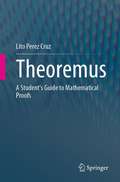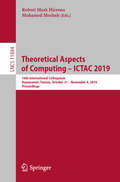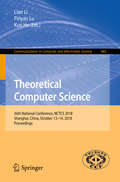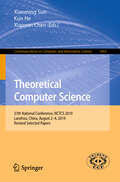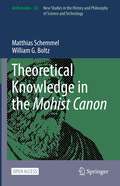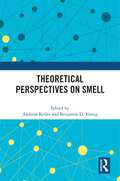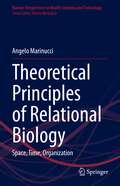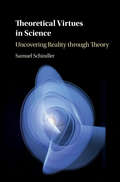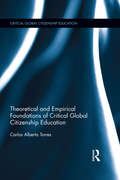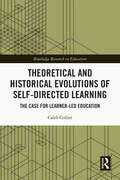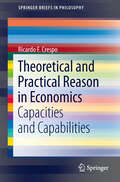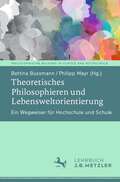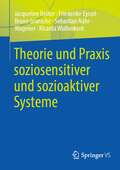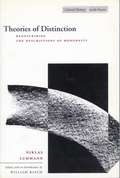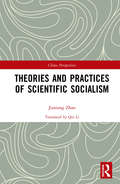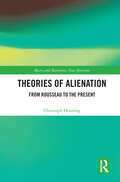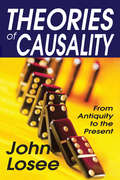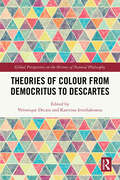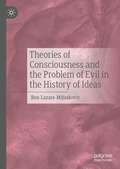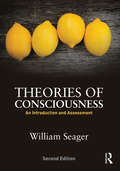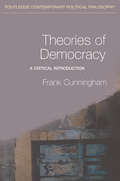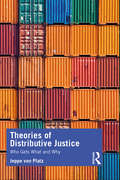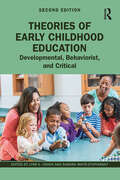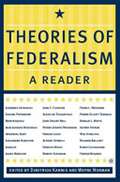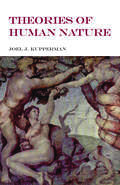- Table View
- List View
Theoremus: A Student's Guide to Mathematical Proofs
by Lito Perez CruzA compact and easily accessible book, it guides the reader in unravelling the apparent mysteries found in doing mathematical proofs. Simply written, it introduces the art and science of proving mathematical theorems and propositions and equips students with the skill required to tackle the task of proving mathematical assertions. Theoremus - A Student's Guide to Mathematical Proofs is divided into two parts. Part 1 provides a grounding in the notion of mathematical assertions, arguments and fallacies and Part 2, presents lessons learned in action by applying them into the study of logic itself. The book supplies plenty of examples and figures, gives some historical background on personalities that gave rise to the topic and provides reflective problems to try and solve. The author aims to provide the reader with the confidence to take a deep dive into some more advanced work in mathematics or logic.
Theoretical Aspects of Computing – ICTAC 2019: 16th International Colloquium, Hammamet, Tunisia, October 31 – November 4, 2019, Proceedings (Lecture Notes in Computer Science #11884)
by Mohamed Mosbah Robert Mark HieronsThis book constitutes the refereed proceedings of the 16th International Colloquium on Theoretical Aspects of Computing, ICTAC 2019, held in Hammamet, Tunisia, in October/November 2019.The 17 revised full papers presented together with 2 keynote papers and 1 industrial paper were carefully reviewed and selected from 138 submissions.The papers are grouped in topical sections on models and transition systems; real-time and temporal logics; verification and concurrency; privacy and security; equations, types, and programming languages.
Theoretical Computer Science: 36th National Conference, NCTCS 2018, Shanghai, China, October 13–14, 2018, Proceedings (Communications in Computer and Information Science #882)
by Lian Li Kun He Pinyan LuThis book constitutes the thoroughly refereed proceedings of the National Conference of Theoretical Computer Science, NCTCS 2018, held in Shanghai, China, in October 2018. The 11 full papers presented were carefully reviewed and selected from 31 submissions. They present relevant trends of current research in the area of algorithms and complexity, software theory and method, data science and machine learning theory.
Theoretical Computer Science: 37th National Conference, NCTCS 2019, Lanzhou, China, August 2–4, 2019, Revised Selected Papers (Communications in Computer and Information Science #1069)
by Kun He Xiaoming Sun Xiaoyun ChenThis book constitutes the thoroughly refereed proceedings of the National Conference of Theoretical Computer Science, NCTCS 2019, held in Lanzhou, China, in August 2019. The 11 full papers presented were carefully reviewed and selected from 28 submissions. They present relevant trends of current research in the area of algorithms and complexity, data science and machine learning theory, and computational model.
Theoretical Knowledge in the Mohist Canon (Archimedes #63)
by Matthias Schemmel William G. BoltzThis open access book presents a new translation, interpretation and analysis of selected passages from the so-called Mohist Canon, a Chinese text from ca. 300 BCE, and discusses the role of the text in the world history of science, arguing that it represents an early emergence of theoretical, systematized knowledge that is independent from parallel developments in ancient Greece. It is aimed at historians of science, of knowledge and of philosophy, and generally at readers interested in these topics from an intercultural perspective and particularly with respect to China.
Theoretical Perspectives on Smell
by Andreas KellerTheoretical Perspective on Smell is the first collection of scholarly articles to be devoted exclusively to philosophical research on olfaction. The essays, published here for the first time, bring together leading theorists working on smell in a format that allows for deep engagement with the emerging field, while also providing those new to the philosophy of smell with a resource to begin their journey. The volume’s 14 chapters are organized into four parts: I. The Importance and Beauty of SmellII. Smell in Time and SpaceIII. What We Perceive through SmellIV. Smell and Other Senses The collection solidifies the area as an important emerging branch of perceptual philosophy by presenting the cutting edge research being done by innovative early career researchers, as well as by those more senior and established within the field.
Theoretical Principles of Relational Biology: Space, Time, Organization (Human Perspectives in Health Sciences and Technology #6)
by Angelo MarinucciThis book proposes the foundation of the relational approach to biology, rejecting the deterministic and reductionist approach of molecular biology. Although biology has made enormous progress in the last seventy years, onto genesis is still conceived as a “revelation” of information (DNA). Recovering the geometric tradition, relational biology conceives scientific and epistemological tools (cause, probability, space etc.) of science in a new way. If probabilistic biology and organicism still proposes a biology based on physics, with a fundamental invariant, relational biology is based on variation: its fundamental invariant is variation, one of the most important elements of life. This is an indispensable book for academics who consider biology from a new theoretical approach, in particular for those working in the domains of cancer, ontogenesis and evolution.
Theoretical Virtues in Science: Uncovering Reality Through Theory
by Samuel SchindlerWhat are the features of a good scientific theory? <P><P>Samuel Schindler's book revisits this classical question in the philosophy of science and develops new answers to it. Theoretical virtues matter not only for choosing theories 'to work with', but also for what we are justified in believing: only if the theories we possess are good ones (qua virtues) can we be confident that our theories' claims about nature are actually correct. Recent debates have focused rather narrowly on a theory's capacity to predict new phenomena successfully, but Schindler argues that the justification for this focus is thin. He discusses several other theory properties such as testability, accuracy, and consistency, and highlights the importance of simplicity and coherence. Using detailed historical case studies and careful philosophical analysis, Schindler challenges the received view of theoretical virtues and advances arguments for the view that science uncovers reality through theory.<P> Provides a detailed and comprehensive treatment of the features that characterize good scientific theories.<P> Puts forward four new arguments for scientific realism, advancing current debates.<P> Challenges the received view of theoretical virtues and addresses issues including demarcation and methodology.
Theoretical and Empirical Foundations of Critical Global Citizenship Education (Critical Global Citizenship Education)
by Carlos Alberto TorresIn the first volume in the Critical Global Citizenship Education series, Torres combines theoretical and empirical research to present an original perspective on global citizenship education as a vitally important way of learning in a globalized world. In examining the requirements for effective global citizenship education and education reform, he investigates pathways to citizenship-building at the local, national and global levels and urges development of teaching methods, teacher education, and curriculum within a social justice education framework. Taking into account post-colonial perspectives, political realities at play, and practical implications, Torres provides a succinct but comprehensive understanding of how global citizenship education can expand the concept of civic education in a global society and interrupt inequality. This volume considers the ways that global citizenship education has been incorporated and is used by international institutions, governments, and the academy, and provides a clear framework for anyone struggling to make sense of the tensions and complexities of global citizenship education today.
Theoretical and Historical Evolutions of Self-Directed Learning: The Case for Learner-Led Education (Routledge Research in Education)
by Caleb CollierThis book analyzes the deep historical and theoretical roots of self-directed learning models in order to put forward a new conceptual understanding of self-directed learning. It utilizes philosophical methods to present arguments, both historical and contemporary, in favor of shifting education toward self-directed models and away from a view of education that places teachers, administration, curriculum, and standards at the center of the learning endeavor. This book demonstrates that self-directed learning has proven to be effective in numerous contexts and builds on this history to present a new philosophy of education termed "Eudemonic Self-Directed Learning," for individual and societal flourishing. Exploring exemplars from different cultural and historical settings to inform post-pandemic pedagogies and policies, this book will appeal to scholars and researchers of the history and philosophy of education, with interests in self-directed learning and its potential for contemporary practice.
Theoretical and Practical Reason in Economics
by Ricardo F. CrespoThe aim of the book is to argue for the restoration of theoretical and practical reason to economics. It presents Nancy Cartwright and Amartya Sen's ideas as cases of this restoration and sees Aristotle as an influence on their thought. It looks at how we can use these ideas to develop a valuable understanding of practical reason for solving concrete problems in science and society. Cartwright's capacities are real causes of events. Sen's capabilities are the human person's freedoms or possibilities. They relate these concepts to Aristotelian concepts. This suggests that these concepts can be combined. Sen's capabilities are Cartwright's capacities in the human realm; capabilities are real causes of events in economic life. Institutions allow us to deliberate on and guide our decisions about capabilities, through the use of practical reason. Institutions thus embody practical reason and infuse certain predictability into economic action. The book presents a case study: the UNDP's HDI.
Theoretisches Philosophieren und Lebensweltorientierung: Ein Wegweiser für Hochschule und Schule (Philosophische Bildung in Schule und Hochschule)
by Philipp Mayr Bettina BussmannDie globalen Veränderungen fordern unser Wissen über die Welt und über uns selbst heraus. Der Klimawandel, die globale Covid-19-Pandemie und Konflikte um die Bedeutung wissenschaftlicher Erkenntnisse führen uns unweigerlich zu einer Vielzahl komplexer philosophischer Fragen. Dabei rücken verstärkt Themen der theoretischen Philosophie in den Vordergrund: Was ist eigentlich Wissen? Auf welche Informationen können wir uns verlassen? Ist die Wahrheit relativ? Was macht ExpertInnen aus? Was ist gute wissenschaftliche Praxis? Was bedeutet ‚evidenzbasiert‘? Welchen sozialen und globalen Einflüssen ist unser Wissenserwerb ausgesetzt? In der Ausbildung von Philosophie- und Ethikstudierenden gibt es oft eine große Scheu, Disziplinen wie Erkenntnistheorie und Wissenschaftsphilosophie zu erlernen und zu unterrichten. Zu abstrakt und lebensweltlich irrelevant, sagen viele. Dieses Buch soll diese Berührungsängste beseitigen helfen, indem die theoretischen Grundlagen auf die Probleme der Gegenwart angewendet und mit vielseitigen Methoden erschlossen werden. Zwei Ziele stehen im Vordergrund: Zum einen soll deutlich werden, dass die Beschäftigung mit theoretischer Philosophie für das persönliche und das gesellschaftliche Zusammenleben von zentraler Bedeutung ist. Zum anderen zeigen eine Reihe didaktischer Tools, wie man Lernende dabei aktiv in den Lernprozess miteinbezieht.
Theorie und Praxis soziosensitiver und sozioaktiver Systeme
by Friederike Eyssel Bruno Gransche Jacqueline Bellon Sebastian Nähr-Wagener Ricarda WullenkordInteraktive technische Systeme sind zunehmend Teil unseres Alltags. Wie aber kann gelingende Mensch-Technik-Interaktion gestaltet werden? Welche Rolle spielen Aspekte sozial angemessenen Umgangs? Für das menschliche Zusammenleben haben sich in jeder Gesellschaft Kulturtechniken des Verhaltens und des Umgangs entwickelt. Wer sie beherrscht, weiß, wann bestimmte soziale Praktiken wie etwa Entschuldigungen angebracht sind und wie sie vollzogen werden. Können und sollten auch Assistenzsysteme mit derartigen Fähigkeiten ausgestattet werden? Das in diesem Buch vorgestellte, interdisziplinär orientierte Rahmenmodell der „FAktoren der Sozialen Angemessenheit“ (FASA-Modell) bietet eine strukturierte Annäherung an die Thematik und liefert eine Grundlage für eine hinsichtlich sozialer Angemesseneheit reflektierte Gestaltung soziosensitiver und soziaktiver Assistenzsysteme.
Theories Of Distinction: Redescribing The Descriptions Of Modernity (Cultural Memory In The Present)
by Niklas Luhmann William RaschThe essays in this volume by Germany's leading social theorist of the late twentieth century formulate what he considered to be the preconditions for an adequate theory of modern society. The first two essays deal with the modern European philosophical and scientific tradition, notably the ogy of Edmund Husserl. The next four essays concern the crucial notion of observation as defined by Luhmann. They examine the history of paradox as a logical problem and as a historically conditioned feature of rhetoric; deconstruct the thinking of Jacques Derrida, especially his language-centered allegiances; discuss the usefulness of Spencer Brown's Laws of Form; and assess the consequences of observation and paradox for epistemology. The following essays present Luhmann's theory of communication and his articulation of the difference between thought and communication, a difference that makes clear one of Luhmann's most radical and controversial theses, that the individual not only does not form the basic element of society but is excluded from it altogether, situated instead in the environment of the social system. The book concludes with a polemic against the critical thought of the Frankfurt School of postwar German social thought.
Theories and Practices of Scientific Socialism (China Perspectives)
by Zhao JiaxiangIn the four volumes of The Development Trajectory of Eastern Society and the Theories and Practices of Socialism, the author re-examines Marx and Engel’s theories on the development trajectory of the Eastern societies by integrating theoretical analysis of Marxist theories and a historical investigation of socialist revolution and construction around the world. This volume discusses the victories and failures of the 100-year trajectory of socialism. Since the Russian Revolution of October 1917, socialism has been practiced for nearly a hundred years in countries at various stages of development. The author provides a proper synthesis of the lessons derived from socialism’s first hundred years as well as China's reforms and interaction with the world. In addition, he analyzes Marx and Engels' socialist theories and their significance for contemporary social development in Eastern societies. Readers who study Marxism, Marxist philosophy, philosophical history and the history of philosophy will find this volume of immense interest.
Theories of Alienation: From Rousseau to the Present (Marx and Marxisms)
by Christoph HenningTheories of alienation had a long history, burgeoned since the 1960s, yet almost disappeared in recent decades – but in his book, Christoph Henning brings these theories back on the agenda, to better account for contemporary social pathologies. Feelings of estrangement, of not feeling at home in the world, in one’s own body or surroundings, are widespread in contemporary societies. They go hand in hand with loneliness, with a burnout, with depression or with anger and hatred. But where do they come from, what do they signify?Henning tracks theories of alienation from three different traditions: first, a conservative approach from Rousseau to Hartmut Rosa explains alienation with change and is based on nostalgia; second, a liberal approach from Simmel to Rahel Jaeggi relies on individual autonomy and explains it as a loss of control; and third, an Aristotelian approach from Humboldt to Marx or British idealism, based on theories of flourishing, relies on a perfectionist anthropology and critical social theory. In doing so, Henning vividly reconstructs these traditions with contemporary examples and excursions into the movies. Theories of Alienation: From Rousseau to the Present shines important new light on this important field of contemporary social philosophy and is very approachable to the general reader.
Theories of Causality: From Antiquity to the Present
by John LoseeWhat types of entities qualify as causes and effects? What is the relationship between cause and effect? How are causal claims to be assessed? The first question deals with the structure of the world; the second is about theories that interpret the relationship of causes to effects; while the third has to do with proper procedure in science and everyday life. This volume is a wide-ranging history of answers that have been given to these three questions, and their relationship to scientific understanding.Losee presents a number of theories of causality within a historical survey that emphasizes the interrelationship between these theories and developments in science. His analysis displays the strengths and weaknesses of these theories so as to contribute to our present understanding of causal relatedness.Among the positions discussed are those of Aristotle, Hume, Kant, Mill, Salmon, Lewis, and Woodward. Losee's analysis displays the strengths and weaknesses of theories that identify causal relatedness with regularity of sequence, probability increase, energy transfer, exchange of a conserved quantity, counterfactual dependence, and inferability.These theories are judged, in part,by their ability to resolvedifficulties posed by instances of overdetermination,causation by omission, preventive causation, and causation by disconnection. Since applications of the theories to these instances disagree, a strategy of employing multiple concepts of causation is examined.Theories of Causality also describes the particular difficulties for causal analysis posed by quantum mechanics. One such difficulty is the prohibition against combining a causal analysis of a quantum process with a spatio-temporal description of that process.
Theories of Colour from Democritus to Descartes (Global Perspectives on the History of Natural Philosophy)
by Katerina Ierodiakonou Véronique DecaixTheories of Colour from Democritus to Descartes investigates issues of the ontological status and perception of colours, such as: What is the nature of colours? Do they exist independently of the subjects who perceive them? And if so, how are they generated and how do they differ from one another? These are some of the questions raised by philosophers, but what has been lacking is an account of the various theories about colours through different periods of the history of philosophy.Exploring philosophical debates on the nature and perception of colours from a historical perspective, this book presents how different theories from Antiquity through the Middle Ages to the early modern era explain the nature of colours, their generation, and the way they are perceived. Twelve eminent historians of philosophy analyse the theories of colours prevailing at critical points in the history of Western philosophy, from its beginnings with Democritus to Descartes and the early modern period.This book will appeal to students and scholars working on the history of philosophy (ancient, medieval, Arabic and Latin, and early modern) as well as those interested in contemporary philosophy: philosophy of the mind, philosophy of perception, phenomenology, metaphysics, and neurosciences. A broader audience may also include researchers in psychology, cultural history, and the history of art.
Theories of Consciousness and the Problem of Evil in the History of Ideas
by Ben Lazare MijuskovicIn this book, Ben Lazare Mijuskovic uses both an interdisciplinary and History of Ideas approach to discuss four forms of intertwined theories of human consciousness and reflexive self-consciousness (Plato, Augustine, Descartes, Leibniz, Kant, and Hegel; Schopenhauer’s subconscious irrational Will; Brentano and Husserl’s transcendent intentionality; and Freud’s dynamic ego). Mijuskovic explores these theories within the context of psychological issues, where the discussion is undergirded by the conflict between loneliness and intimacy. He also explores them in the context of ethics, where the dynamic is between the values of good and evil. The book historically traces these issues in both a personal as well as a political framework.
Theories of Consciousness: An Introduction and Assessment
by William SeagerDespite recent strides in neuroscience and psychology that have deepened understanding of the brain, consciousness remains one of the greatest philosophical and scientific puzzles. The second edition of Theories of Consciousness: An Introduction and Assessment provides a fresh and up-to-date introduction to a variety of approaches to consciousness, and contributes to the current lively debate about the nature of consciousness and whether a scientific understanding of it is possible. After an initial overview of the status and prospects of physicalism in the face of the problem of consciousness, William Seager explores key themes from Descartes - the founder of the modern problem of consciousness. He then turns to the most important theories of consciousness: identity theories and the generation problem higher-order thought theories of consciousness self-representational theories of consciousness Daniel Dennett’s theory of consciousness attention-based theories of consciousness representational theories of consciousness conscious intentionality panpsychism neutral monism. Thoroughly revised and expanded throughout, this second edition includes new chapters on animal consciousness, reflexive consciousness, combinatorial forms of panpsychism and neutral monism, as well as a significant new chapter on physicalism, emergence and consciousness. The book’s broad scope, depth of coverage and focus on key philosophical positions and arguments make it an indispensable text for those teaching or studying philosophy of mind and psychology. It is also an excellent resource for those working in related fields such as cognitive science and the neuroscience of consciousness.
Theories of Democracy: A Critical Introduction (Routledge Contemporary Political Philosophy)
by Frank CunninghamThis is the first book to be published in this exciting new series on political philosophy. Cunningham provides a critical and clear introduction to the main contemporary approaches to democracy: participatory democracy, classic and radical pluralism, deliberative democracy, catallaxy, and others. Also discussed are theorists in the background of current democratic thought, such as Tocqueville, Mill, and Rousseau. The book includes applications of democratic theories including an extended discussion of democracy and globalisation.
Theories of Distributive Justice: Who Gets What and Why
by Jeppe PlatzHow should we design our economic systems? Should we tax the rich at a higher rate than the poor? Should we have a minimum wage? Should the state provide healthcare for all? These and many related questions are the subject of distributive justice, and different theories of distributive justice provide different ways to think about and answer such questions. This book provides a thorough introduction to the main theories of distributive justice and reveals the underlying sources of our disagreements about economic policy. It argues that the universe of theories of distributive justice is surprisingly simple, yet complicated. It is simple in that the main theories of distributive justice are just four in number, and in that these theories each offer a distinct, well-defined theoretical approach to distributive justice; yet it is complicated in that the main theories disagree at several distinct, fundamental levels, and in that it is possible to spin innumerable new theories from the elements of the four main theories. Key Features: Covers the four major theories of distributive justice and their leading philosophers, elucidating the attractions and drawbacks of each: Friedrich A. von Hayek and right-liberalism; John Rawls and left-liberalism; Robert Nozick and libertarianism; Gerald A. Cohen and socialism. Explains why these four theories have come to dominate most philosophical discussions on distributive justice, highlighting the essential answer provided in each that is lacking in other theories. Written for any reader interested in the topic, with an annotated reading list at the end of each chapter and helpful glossary at the back of the book.
Theories of Early Childhood Education: Developmental, Behaviorist, and Critical
by Lynn E. Cohen Sandra Waite-StupianskyTheories of Early Childhood Education continues to provide a comprehensive overview of the various theoretical perspectives in early childhood education from developmental psychology to critical studies, Piaget to Freire. This revised and updated edition includes additional chapters on Michael Alexander Halliday’s view of language learning and the attachment theory work of John Bowlby and Mary Ainsworth. Each author questions assumptions underpinning the use of theory in early childhood education and explores the implications of these questions for policy and practice. Theories reported in this book are a timely reminder of the importance of the relationship between theory and practice necessary for teacher candidates, teacher educators, and early childhood teachers. Students will learn the fundamentals while in-service teachers and professionals will learn the theory behind field observations for their certification exams.
Theories of Federalism: A Reader
by Dimitrios Karmis Wayne NormanThis project pulls together classic and modern readings and essays that explore theories of federalism. Spanning the Seventeenth through Twenty-first-centuries of European, U.S. and Canadian thinkers, this attempts to be a comprehensive reader for students in political theory. <p><p> The emphasis throughout is on the normative argument, the advantages or disadvantages of federal and confederal arrangements compared to unitary states, and on the relative merits of various proposals to improve particular federations or confederations. These also draw on the full range of political science subfields: from political sociology, political economy and constitutional studies to comparative politics and international relations. There are also readings, both contemporary and historical, that attempt to clarify conceptual issues.
Theories of Human Nature
by Joel J. KuppermanQuestions for Further Consideration and Recommended Further Reading, which follow each relevant chapter, encourage readers to think further and to craft their own perspectives.
